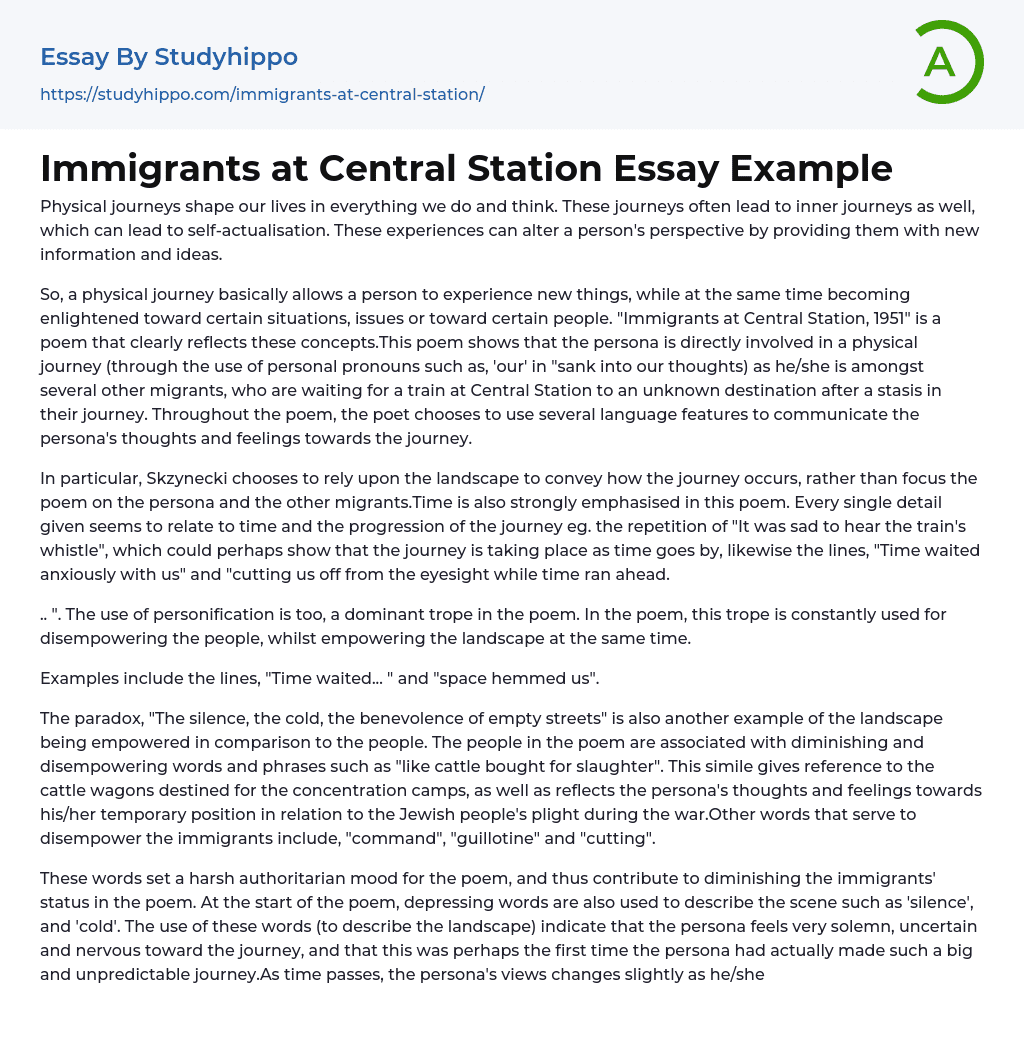Physical journeys shape our lives in everything we do and think. These journeys often lead to inner journeys as well, which can lead to self-actualisation. These experiences can alter a person's perspective by providing them with new information and ideas.
So, a physical journey basically allows a person to experience new things, while at the same time becoming enlightened toward certain situations, issues or toward certain people. "Immigrants at Central Station, 1951" is a poem that clearly reflects these concepts.This poem shows that the persona is directly involved in a physical journey (through the use of personal pronouns such as, 'our' in "sank into our thoughts) as he/she is amongst several other migrants, who are waiting for a train at Central Station to an unknown destination after a stasis in their journey. Throughout t
...he poem, the poet chooses to use several language features to communicate the persona's thoughts and feelings towards the journey.
In particular, Skzynecki chooses to rely upon the landscape to convey how the journey occurs, rather than focus the poem on the persona and the other migrants.Time is also strongly emphasised in this poem. Every single detail given seems to relate to time and the progression of the journey eg. the repetition of "It was sad to hear the train's whistle", which could perhaps show that the journey is taking place as time goes by, likewise the lines, "Time waited anxiously with us" and "cutting us off from the eyesight while time ran ahead.
.. ". The use of personification is too, a dominant trope in the poem. In the poem, this trope is constantly used for disempowering the people, whilst empowering the
landscape at the same time.
Examples include the lines, "Time waited... " and "space hemmed us".
The paradox, "The silence, the cold, the benevolence of empty streets" is also another example of the landscape being empowered in comparison to the people. The people in the poem are associated with diminishing and disempowering words and phrases such as "like cattle bought for slaughter". This simile gives reference to the cattle wagons destined for the concentration camps, as well as reflects the persona's thoughts and feelings towards his/her temporary position in relation to the Jewish people's plight during the war.Other words that serve to disempower the immigrants include, "command", "guillotine" and "cutting".
These words set a harsh authoritarian mood for the poem, and thus contribute to diminishing the immigrants' status in the poem. At the start of the poem, depressing words are also used to describe the scene such as 'silence', and 'cold'. The use of these words (to describe the landscape) indicate that the persona feels very solemn, uncertain and nervous toward the journey, and that this was perhaps the first time the persona had actually made such a big and unpredictable journey.As time passes, the persona's views changes slightly as he/she realises that his/her future can still be hopeful.
The persona becomes more optimistic towards the end as he/she realises that his/her future is not fixed, and that there is still hope for a bright new future. The line, "along glistening tracks of steel", (which despite its ambiguity could be symbolic for hope and a bright new future, or the sharpness of a weapon, or even the flowing of time) highlights the persona's change of view
from a pessimistic view to an optimistic one.The persona no longer uses pessimistic words, but instead uses optimistic ones like, 'glistening', which just shows that the persona became enlightened from that experience. This poem has helped enlighten my understanding of how physical journeys have shaped our lives. After reading this poem I realise that physical journeys can bring upon uncertain futures as well as cause anxiety and uncertainty for the person who is undergoing the journey. I also realise how much impact a physical journey really has on your life (views toward certain people, situations, etc), regardless of the length of the journey.
- Age Of Enlightenment essays
- Ethos essays
- Time essays
- Acceptance essays
- Meaning Of Life essays
- Reality essays
- Natural Law essays
- Political Philosophy essays
- Utilitarianism essays
- Existence essays
- Free Will essays
- Good And Evil essays
- Confucianism essays
- Relativism essays
- Conscience essays
- Environmentalism essays
- Empiricism essays
- Epistemology essays
- Ethics essays
- Existentialism essays
- Human Nature essays
- Individualism essays
- Metaphysics essays
- Philosophy Of Life essays
- Transcendentalism essays
- Truth essays
- Destiny essays
- Determinism essays
- Fate essays
- Functionalism essays
- Philosophers essays
- Pragmatism essays
- Future essays
- Child Observation essays
- Critical Reflection essays
- Teaching Philosophy essays
- Personal Philosophy essays
- Action Speak Louder Than Words essays
- Can Money Buy Happiness essays
- Values of Life essays
- Ethical dilemma essays
- Normative Ethics essays
- Virtue Ethics essays
- Belief essays
- Deontology essays
- Moral essays
- Virtue essays
- Work Ethic essays
- Henry David Thoreau essays
- Carl Jung essays




